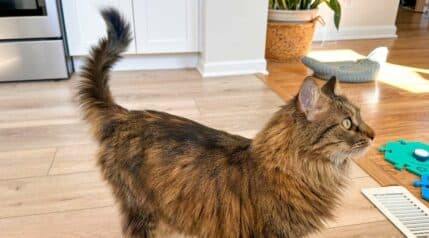When you purchase through links on our site, we may earn a commission. Here’s how it works.
One of the absolute greatest pleasures of having a cat is seeing your furball get comfy enough at home to “make biscuits” or knead on your lap or blankets. If you are lucky enough to get the baker’s treatment, it’s a sign your cat feels comfortable around you.
While it’s entertaining to see our cats busy working at the biscuit factory, obsessive kneading can signify underlying troubles. Read on to learn why cats knead and how to support a cat who kneads obsessively.
What Is Cat Kneading?
Taking its name from a baker working bread dough, cat kneading happens when a cat begins to push their paws out in a rhythmic motion, alternating from left to right. You may notice your cat purr or drool in tandem with this movement. Not all cats knead, but most cats will exhibit this behavior occasionally.
Why Do Cats Knead?
Kneading is an instinctual behavior in cats. As kittens, cats knead to stimulate their mother’s milk flow. While we are unsure why kneading continues into adulthood, there are various theories as to why adult cats knead:
To Comfort
A popular theory for why cats continue to knead into adulthood is that kneading evokes the same feelings of comfort and safety as a kitten drinking mom’s milk. Kneading is a leftover from kittenhood that comforts cats of all ages. Kneading is a great self-soothing tool for a stressed cat and can be used to show contentment when your cat is particularly happy.
To Show Affection
If your cat chooses you as the designated kneading surface, this may signify that you’re the favorite. Your cat loves you, and this is their way of showing it. If your kitty is feeling especially lovey-dovey, they may even treat you to a few slow blinks. Referred to as “cat kisses,” when a cat slowly blinks at their owner, it’s a sign of love, trust, and affection.
To Prepare A Resting Place
In the wild, cats knead grasses and other vegetation into soft piles for sleeping. Kneading in domestic cats may be an ingrained behavior from their ancestry.
To Stretch
Kneading is often accompanied by a nice big stretch. Cats may knead to stretch their back, shoulders, and legs after a long cat nap.
To Mark Their Territory
Cats have glands in their paws that secrete a scent marking. Kneading lets other cats know what belongs to whom.
What If My Cat Has Claws And Kneads?

The truth is: Sometimes love hurts. While kneading is normal, it can be painful to be the recipient of this cat behavior, especially if your cat extends their claws as they knead.
To prevent destruction or kneading in unwanted areas:
- Regularly trim your cat’s nails. Keeping your feline’s nails short will prevent snags on clothing and other soft surfaces. Plus, it will be far less painful if your cat chooses to only knead on their favorite person.
- Encourage kneading on specific areas. If you hate when your cat kneads on you (or your expensive home goods), redirect your feline to knead on a specific blanket, towel, pillow, or other approved area.
- Cover yourself with a thick blanket when your cat wants to knead you. Your skin will enjoy the extra cushion, and your kitty will be happy to show you love through the extra soft padding.
- Train your cat to play instead of kneading. Whenever your cat starts to make biscuits, use positive reinforcement and encourage your cat to play instead of kneading.
Some cats won’t stop kneading, and that’s ok. Making biscuits is normal for cats and usually means they are content, relaxed, and happy.
What If My Cat Kneads Obsessively?
If your cat is kneading more frequently or more aggressively, it may be an indicator that your feline feels anxious. Kneading can be a way for cats to self-soothe during particularly stressful periods. Kneading can also be a way for your cat to connect and receive some soothing rubs in return, especially if you’ve been gone for the day.
While kneading is a normal behavior in cats, obsessive kneading is a behavioral disorder that can signal an overly stressed cat. Compulsive kneading may release pain-relieving chemicals in your cat’s brain, thus encouraging kneading as a coping mechanism.
If you notice your cat kneading more frequently, consult your veterinarian. Your vet will examine your feline and access any incidents that could have caused stress. It is important to familiarize yourself with your cat’s behaviors for this reason. A detailed history can help your vet properly understand and diagnose any conditions.
Is My Cat Stressed Out?
While kneading can signify a stressed cat, it is also a natural and normal behavior. When considering if your cat is anxious or fearful, think of encounters or events that may impact your cat negatively. Cats crave security and familiarity. While a change might be considered small to us, it could be very upsetting for your cat.
Significant Causes Of Stress For Cats
Think about anything that would stress you out, including life changes. These changes can also affect your cat. It’s especially troubling for cats since, for them, it comes out of the blue. One day they’re relaxing in their favorite window seat; the next thing they know, they’re traveling to a new home.
Major causes of stress for cats include:
- Death of a family member
- Marriage
- New baby
- Moving to a new home
- Renovations
- Neglect
- Loneliness
- Illness or injury
- Abuse
- Natural disasters
Whenever big-time stress events happen, it’s important to give your kitty extra attention. Provide lots of playtime and try to maintain a normal schedule. Monitor our cat’s eating and litter box habits, and call your vet if you notice any significant changes.
Overlooked Causes Of Stress For Cats
While it’s easy to understand how a house fire or new family could affect your cat’s mood, many seemingly little things can cause major stress for our fur babies. Consider the following factors that may influence your cat’s stress levels and, if possible, eliminate or modify any causes of stress:
Minor causes of stress for cats include:
- Change in food
- Change in litter
- Dirty litter box
- Litter box in a noisy location
- Food and litter box too close together
- Children
- Rough handling
- Travel
- Change in human’s work schedule
- Boarding
- Home rearrangement
- Addition of another pet
- Loud noises
- Zero hiding places
Ensure your cat always has access to personal safe spaces where they can hide from noise, pets, and people if needed. Give your cat plenty of cuddles. Contact with their favorite human can make a world of difference for an anxious cat.
Should I Stop My Cat From Kneading?
Never discourage your cat from kneading. If your cat is using kneading as a stress outlet, punishing your cat can increase anxiety and make kneading even more frequent. In addition, your cat may choose more destructive behavior if they cannot express their pent-up emotions through kneading.
How Should I Support My Anxious Cat?
If you suspect your cat is stressed or has an anxiety disorder, contact your veterinarian for guidance. Before visiting your veterinarian, pay attention to any additional cat behaviors that may signal distress, including:
- Hissing or aggression
- Hiding
- Meowing
- Spraying
- Eliminating outside the litter box
- Intentional destruction of home items
After examining your cat and getting a detailed history of their behavior, your vet may prescribe a medication to help your cat cope with anxiety. Many over-the-counter supplements can also be useful in calming an anxious cat, such as l-theanine, valerian root, and CBD.
Frequently Asked Questions
Why Do Cats Knead Blankets?
Where a cat kneads is all about personal preference. Some cats prefer to make biscuits on their owner, and others prefer a soft blanket or pillow. If your cat is sucking on a blanket, it may be a sign your cat is stressed.
Do Cats Knead Differently?
Yes, cats can knead differently. There is no right or wrong way to make biscuits. Some cats lazily knead and purr while getting scratches. Some cats use their claws for kneading aggressively. Others really get into it and use all four paws!
Why Isn’t My Cat Kneading Me?
If your feline isn’t kneading you, it doesn’t mean your cat isn’t happy or doesn’t love you. Just like humans, felines have all different ways of communicating. Your cat may wish to show contentment or affection in other ways.
Final Thoughts
While this article focuses on health disorders associated with obsessive kneading, it’s important to remember that kneading can be a natural and downright cute behavior. If your kitty is happy and shows no other signs of distress, it’s ok to let them knead to their heart’s content.





